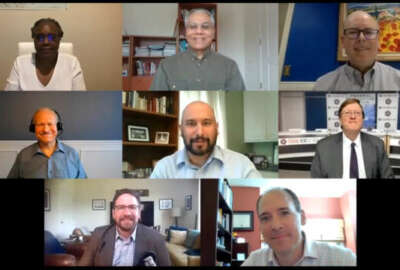

The Defense Department and government at large need to bolster their workforce around artificial intelligence and invest more heavily in the underlying...
The Defense Department and government at large need to bolster their workforce around artificial intelligence and invest more heavily in the underlying infrastructure supporting it, according to commissioners of a congressionally-mandated panel.
Members of the National Security Commission on Artificial Intelligence (NSCAI) told Congress Thursday that without embracing immigrants, encouraging “people in weird corners” of America and building a reserve of scientifically curious people, the United States will fall behind in one of the most impactful technologies for the future.
“We need to take bolder action,” Mignon Clyburn, NSCAI commissioner and principal at MLC Strategies told the House Armed Services Subcommittee on Emerging Threats. “Existing programs will not bring enough digital talent into the public service workforce to meet serious shortages. The current scholarship and service programs are limited in scale. They will not create a common set of ideas, shared experiences, professional culture or a common mission to improve the government’s digital talent. We must fundamentally reimagine the way you, the U.S. government, recruits and builds [its] digital workforce.”
NSCAI was created by the 2019 National Defense Authorization Act, and released its interim report last November. The commission’s work is “to consider the methods and means necessary to advance the development of artificial intelligence, machine learning, and associated technologies to comprehensively address the national security and defense needs of the United States.”
AI is becoming more and more ubiquitous in everyday life and in technologies. It has implications for everything from social media apps to nuclear weapons. The United States is concerned that it will be eclipsed by China in the AI realm.
Eric Schmidt, NSCAI chairman and former leader of Alphabet, said the government needs to embrace the Chinese scholars interested in coming to the United States.
“In China they’re going to start up a whole bunch of companies that are going to become a real pain in the ass for Congress in a decade,” Schmidt said. “I’d much rather have them creating huge successes in America for security, and also, for commercial reasons.”
Schmidt pointed to the National Security Innovation Pathway bill as a good step forward in bringing in those immigrants.
The bipartisan bill provides visa and residency pathway to create pipeline of essential scientific and technical experts to bolster innovation for national security.
“The United States attracts some of the best minds to our universities and innovative companies and develops their expertise,” bill co-sponsor the House Armed Services Subcommittee on Emerging Threats Chairman Jim Langevin (D-R.I.) said in June when the bill was introduced. “They can fortify national security and protect our citizens, critical infrastructure and interests. Unfortunately, much of that talent leaves because there are few options to remain. This critical legislation to retain and leverage researchers and technologists will boost the innovation that backs our national defense efforts.”
Schmidt also advocated for a national AI research resource — a cloud of data governed by the U.S. that could be used by researchers.
“It creates an infrastructure that allows all of the creative people in the United States access to the systems where they can do the research,” Schmidt said. “One of the hallmarks of American creativity has been that the greatest things come from the weirdest corners. We want to make sure that those weird corners in the United States with clever people who are staying up all night drinking Diet Coke and eating hamburgers have the tools that they need to do global solutions very quickly.”
He said people who work for large companies or in academia have access to that information, but it’s hard for small companies and individuals.
There is a bill currently in Congress that would create a task force on how to set up and maintain that resource.
The commission plans to release its final report in March 2021. Meanwhile, Congress is mulling over the interim report’s recommendations.
Those include creating a National Digital Reserve Corps to bring in private talent to the government and the creation of a national digital service academy..
Copyright © 2025 Federal News Network. All rights reserved. This website is not intended for users located within the European Economic Area.
Scott Maucione is a defense reporter for Federal News Network and reports on human capital, workforce and the Defense Department at-large.
Follow @smaucioneWFED



